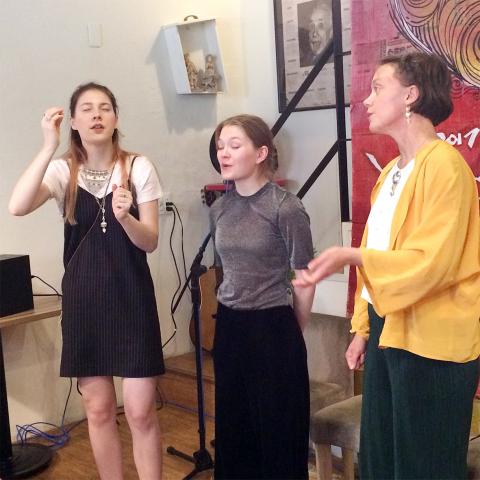Taipei hosts the 15th Migration Music Festival (流浪之歌音樂節) this weekend, with folk musicians from a variety of cultures coming to perform.
This year features an all-female line up of 11 acts from nine countries. The theme, “I’m not in my room” is a nod to Virginia Woolf, who famously said “a room of one’s own” was a necessity for women writers to flourish. The festival celebrates creative women breaking boundaries in the world of music.
Trees Music and Art’s (大大樹音樂圖像) artistic director Chung She-fong (鍾適芳) says she knew all the artists personally and wanted to create an event where they could all gather and share their talent.

Photo Courtesy of Trees Music and Art
“We hope to encourage female artists through this event,” Chung says. “Women face more obstacles as artists.”
Many of the invited performers took the stage at a press conference yesterday. Flamenco-inspired notes emerge from the guitar of Portuguese singer-songwriter Lula Pena, as her deep, husky voice holds the audience captive.
The Norwegian and Swedish trio of Golbma Jiena sing traditional pieces in the Sami language in three-part harmony, playing with glottal stops and contorting their bodies to produce other-worldly sounds.
The festival will not only showcase music rarely heard in Taiwan, but also screen short documentaries which tell stories of women who undergo great sacrifices to make music. Open discussions and storytelling will follow each screening.
The main performance space will be Zhongshan Hall (中山堂), with performances also held in small studios and cafes around Taipei, Chung says.
This year’s line up includes acts from as far afield as Somaliland and Scandinavia, as well as Taiwan’s own Aboriginal singer-songwriter Panai Kusui.

Taiwan has next to no political engagement in Myanmar, either with the ruling military junta nor the dozens of armed groups who’ve in the last five years taken over around two-thirds of the nation’s territory in a sprawling, patchwork civil war. But early last month, the leader of one relatively minor Burmese revolutionary faction, General Nerdah Bomya, who is also an alleged war criminal, made a low key visit to Taipei, where he met with a member of President William Lai’s (賴清德) staff, a retired Taiwanese military official and several academics. “I feel like Taiwan is a good example of

March 2 to March 8 Gunfire rang out along the shore of the frontline island of Lieyu (烈嶼) on a foggy afternoon on March 7, 1987. By the time it was over, about 20 unarmed Vietnamese refugees — men, women, elderly and children — were dead. They were hastily buried, followed by decades of silence. Months later, opposition politicians and journalists tried to uncover what had happened, but conflicting accounts only deepened the confusion. One version suggested that government troops had mistakenly killed their own operatives attempting to return home from Vietnam. The military maintained that the

Before the last section of the round-the-island railway was electrified, one old blue train still chugged back and forth between Pingtung County’s Fangliao (枋寮) and Taitung (台東) stations once a day. It was so slow, was so hot (it had no air conditioning) and covered such a short distance, that the low fare still failed to attract many riders. This relic of the past was finally retired when the South Link Line was fully electrified on Dec. 23, 2020. A wave of nostalgia surrounded the termination of the Ordinary Train service, as these train carriages had been in use for decades

Lori Sepich smoked for years and sometimes skipped taking her blood pressure medicine. But she never thought she’d have a heart attack. The possibility “just wasn’t registering with me,” said the 64-year-old from Memphis, Tennessee, who suffered two of them 13 years apart. She’s far from alone. More than 60 million women in the US live with cardiovascular disease, which includes heart disease as well as stroke, heart failure and atrial fibrillation. And despite the myth that heart attacks mostly strike men, women are vulnerable too. Overall in the US, 1 in 5 women dies of cardiovascular disease each year, 37,000 of them